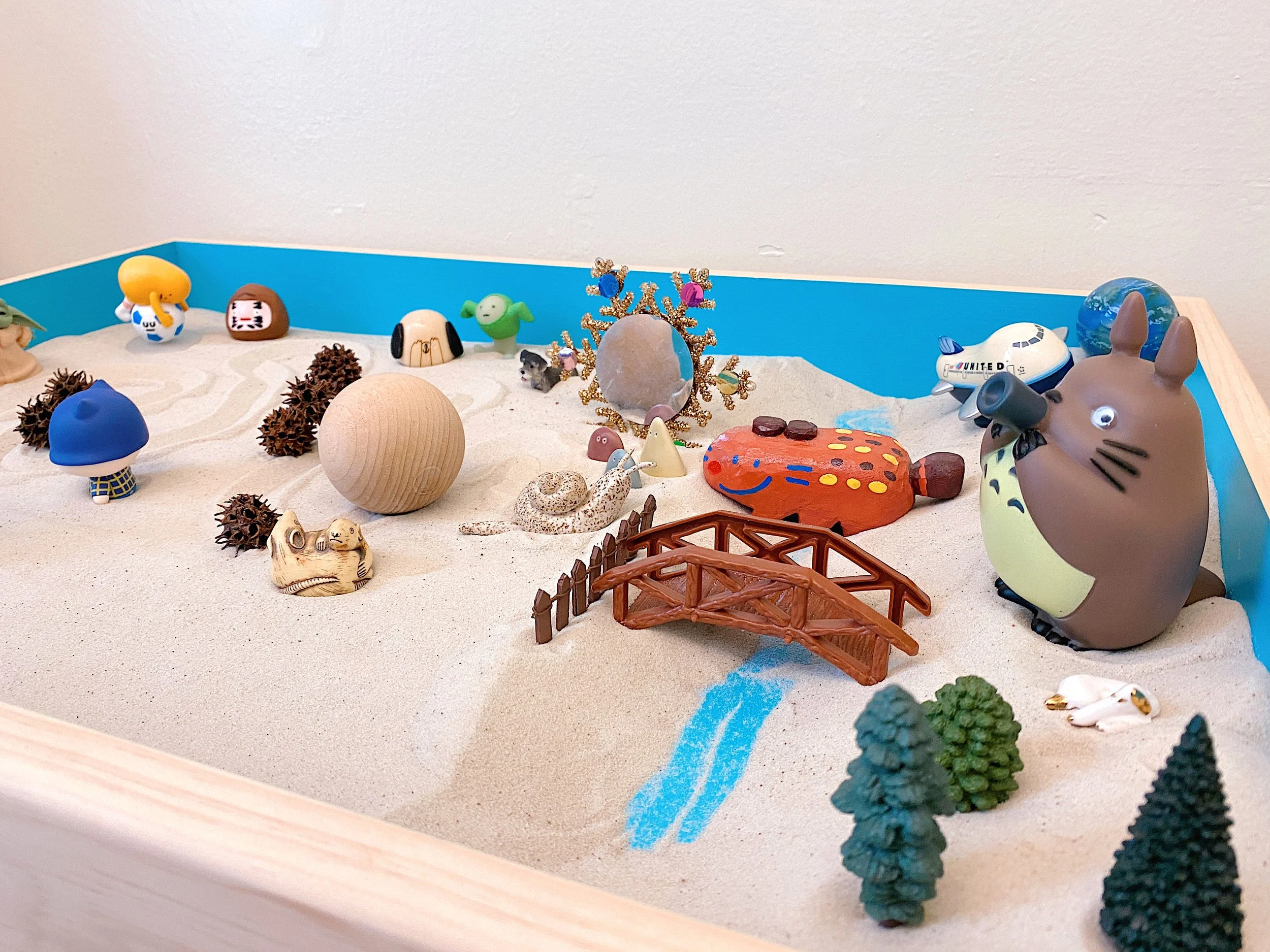Therapy doesn’t have to fit in a box
I combine ACT (Acceptance & Commitment Therapy) and Contextual Behavioral Science with Sandtray and Nature Therapy. These modalities:
Are individualized and custom-tailored to each person I work with;
Apply to a wide range of diagnoses and issues;
Are creative and experiential;
Resonate with me as a human and as a therapist; and
Are supported by solid scientific evidence (read more: ACT, Sandtray, Nature Therapy).
-
ACT
Connect with your values and take action. Learn skills for coping flexibly with difficult thoughts, feelings, and situations. Slow down, be present, and get curious. Practice in therapy, take it into your life.
-
Nature & Walking Therapy
Appreciate nature and calm the nervous system. Get out of your thinking mind and into your sensory experience: sight, sound, sensation, smell, taste. More being, less doing. Bathe in the forest atmosphere or do therapy on the beach!
-
Sandtray
Creatively express yourself using sand & physical images. Process non-verbally. Pause, linger, be present with what arises. Gain new perspectives, make unexpected connections. Permission to play and create without an agenda.
Principles & beliefs that guide my practice:
-
Being human means encountering pain, difficulty, loss, disappointment, fear, grief, anxiety, and many unpleasant experiences. We often feel alone in our pain: “Everyone else has it together and I’m a mess/broken/too weak/can’t do this.”
This is especially true for those of us with chronic health issues, where we might feel judged, criticized, misunderstood, and painfully alone. In therapy, I aim to give you a corrective experience of feeling connected – linked to a fellow human in a journey of caring and hurt, values and vulnerabilities, delight and difficulty. From this place of common humanity, we can cultivate kindness and compassion towards ourselves and others. We can also learn to respond more flexibly and skillfully.
-
I ground our work in Values: What do you want to stand for in life, if you could choose anything? What strengths and qualities do you want to develop? How do you want to treat yourself and others? What qualities of living make life rich, full, and meaningful?
As an ACT therapist, I’ll help you clarify what is truly important to you, move in those directions, and respond flexibly to barriers that show up along the way. We'll practice this in session and then work to bring it into your life more consistently.
If you aren’t sure what’s important to you, don’t worry – that is some of my favorite work to do in therapy.
Kindness, Service, and Curiosity are some of my chosen values. You’ll feel them in the therapy room with me. I care fiercely about the people I serve, I bring my whole heart into therapy, and I always love the chance to learn more.
-
I believe in experiential therapy. Experience is a powerful teacher and can be far more impactful than words or concepts. As a juggler, I think about this all the time: I can’t learn to juggle by reading a book and understanding it conceptually. I can only learn to juggle by tossing balls in the air, dropping them a lot, learning from that direct experience, and eventually improving my catching and throwing skills. Metaphorically speaking, I want you to leave therapy having juggled rather than talking about juggling. Hence, we will aim to prioritize experiential learning over conceptual learning. In a session, we might use objects around the room, physically interact with a thought or feeling on an index card, notice feelings in the body, walk outside, use the Sandtray, play tug of war, hold an ice cube, eat a meal together, and more. I've noticed that these physical experiences and metaphors are often more memorable - and thus more likely to translate into change outside of therapy. I view therapy as a learning laboratory, and we are curious scientists investigating, exploring, and trying out new things.
-
I believe that Slowing Down is crucial – and most of us don’t do it enough. Many of us have learned patterns to move fast as a way to avoid things, to respond to difficulty, or simply to keep up with the frenetic pace of modern life. It’s possible to be talking on a phone call, checking email, walking the dog, and drinking coffee at the same time. We often don’t realize how fast we’ve been moving until we slow down. In therapy, I will give you permission to slow down and disrupt the go-go-go pattern in a variety of ways: sitting and simply noticing, finding stillness in nature, mindful movement, and more. Slowing down often allows us to get much clearer on what we value, as well as to explore different and more flexible responses to difficulty.
-
I believe that physical health and mental health are inseparable. I’ve lived with type 1 diabetes for nearly 25 years, so I understand this intimately and experience it every day. My first career was as a journalist in the diabetes field, where I spent nearly ten years writing all about physical health. After graduate school, I did my clinical training in high-acuity teenage eating disorders. As a multidisciplinary team, we constantly navigated the interplay between physical and mental health, each influencing the other. In therapy, we’ll be really curious about the whole picture - e.g., vital signs, sleep, movement, food & eating behaviors, stress & the nervous system, thoughts, feelings, urges, behaviors, life context, relationships, and how all these variables interact.
-
In therapy, I aim to appreciate you like a beautiful sunset, rather than try to “solve” you or “figure you out” like a math problem. These are fundamentally different modes of mind and you can really feel the difference in a relationship.
What does it feel like to be treated like a math problem – something that needs to be fixed and solved? How many of us have a relationship where we are truly treated like a sunset? It’s common to have a long history of being treated like a math problem, especially in different healthcare care settings. I aim to give you a corrective (sunset!) experience.
Credit for this metaphor goes to Dr. Kelly Wilson, author of the brilliant Mindfulness for Two, a co-founder of ACT, and a very inspiring therapist.
-
I will connect with you as a fellow human changing through time; you are not merely a static medical diagnosis or label. Together, we will work to understand your life context (biophysiological, social, cultural); learning history; and a set of psychological flexibility processes that present across many diagnoses. You can imagine each of these six processes on a spectrum from psychologically inflexible to flexible. Below, I've included some paired statements that give a simplified feel of each process.
Attention to Present:
- I spend most of my time lost in thought about the past or worrying about the future.
- I pay attention to what is happening in the present moment.Defusion:
- My thoughts tell me how things really are and determine what I do next.
- I notice my thoughts as just one of many ways to think about things. What I do next is up to me.Acceptance:
- I constantly struggle with my thoughts and feelings.
- I willingly accept my thoughts and feelings, even when I don't like them.Self:
- Deep down, my thoughts and feelings are the real me.
- My thoughts and feelings come and go, but deep down the real me doesn't changeValues:
- I'm not sure what I care about.
- I am clear about my priorities in life.Committed Action:
- I don't manage to act on the things I care about.
- I take action and put effort into the things that I care about.These processes are all interlinked and unfolding in real-time in therapy, which is what makes ACT so darn cool, rich, and creative. I find that this process-based approach really honors individual differences: someone with diabetes or anxiety or trauma or an eating disorder might have the same textbook "diagnosis" label, but will differ markedly in how the above processes play out in their life. This allows us to custom tailor treatment to your needs and hopefully work more effectively and efficiently.
Let’s connect!
OR
complete the form below and I’ll be in touch!


